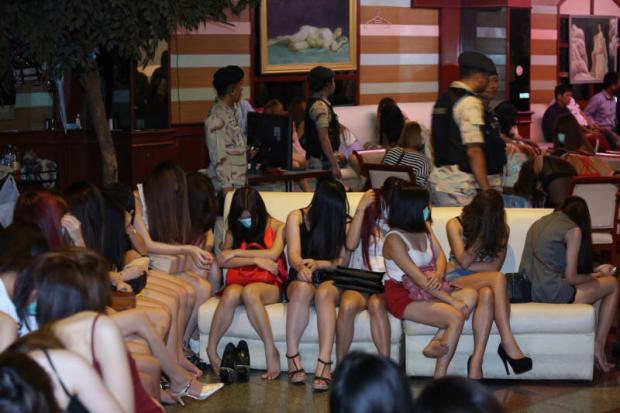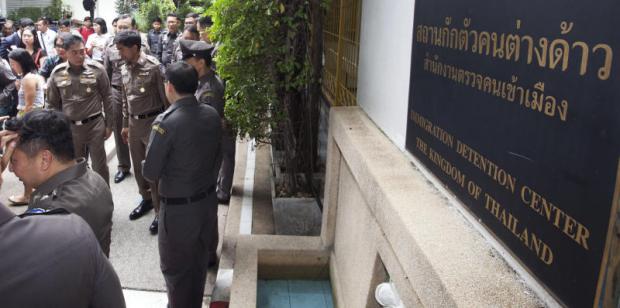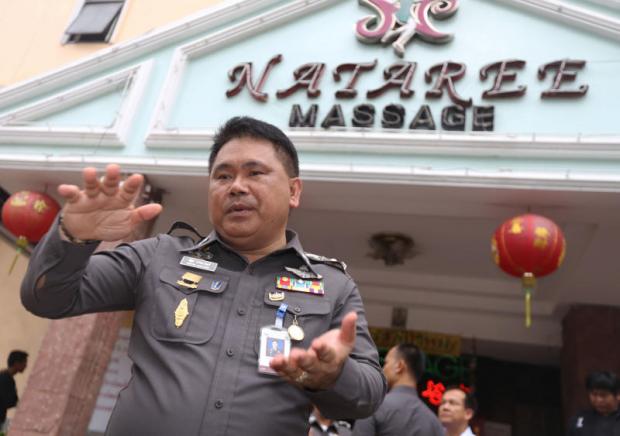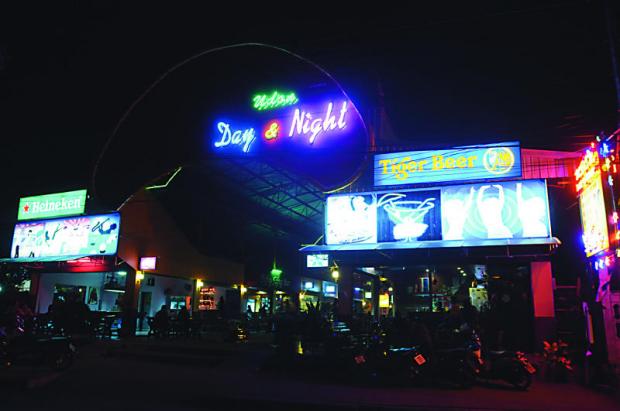
Strolling around downtown Udon Thani, visitors quickly gain the impression it is not much different from other major cities in Thailand. The locals are genuinely friendly and the streetscape consists of the usual food stalls, mega shopping malls and night market, adding a big-city vibe to the culturally rich northeastern hub.
But after sunset, five minutes away from the city's night market the atmosphere quickly changes.
"Do you want to hang out with young girls?" one tuk-tuk driver asks with a mischievous grin on his face. "I can take you to meet them there. They are all young and beautiful girls from Laos."
In a narrow soi between a major hospital and upmarket hotel, hostess bars, massage parlours and karaoke bars with dim red lights replace the safe feeling of the daytime. It's not as in-your-face as Pattaya or Bangkok's Soi Nana, but it's obvious more than just alcohol is available.
Some owners go to great pains to make out that their business is above board. "Which girl do you want? She can sit and have a drink with you but nothing more," says the pushy manager of a hostess bar.
But an elderly German tourist who visits Thailand every year is far blunter about the sex trade in the Northeast when he speaks to Spectrum in an Irish bar. Apart from the Lao sex workers, he says Udon Thani and the surrounding areas of northern Isan are now a major hub for sex tourists from Europe. Disturbingly, he says it is known among many older men for the availability of girls and boys.
"It is less hassle here to have fun with these kids unlike Pattaya where they can easily get arrested," says the German man. "I heard from friends that sometimes sex tourists will arrange trips to some of the villages in Isan. Once they get there, they can pick anyone they like and take them out."
Cross-border human trafficking for prostitution is not something new to Thailand. Underage girls and women from Laos, Myanmar and Cambodia see Thailand as an easy place to earn cash from selling themselves. Though they might be looked on as victims, many of them come to work in the sex trade of their own volition, according to NGOs offering support to the sex workers.
Often they are caught, detained and deported, yet the pattern for most of them is to return to sex work in Thailand. But local NGOs and academics are concerned about the methods of arrest where police have sex with the workers, bribery and the detention of the victims.
MONEY-MAKING HUB
Dao is from Laos and claims to be 14 years old. However, with red lipstick and heavy make-up she looks much older. Her claims to being underage could be what her potential customers want to hear.
She is a good-looking girl with light skin and a delicate demeanour. While sitting at the counter of the bar she works at, she tells Spectrum her relatives encouraged her to come to work in Udon Thani as she could earn a lot more money than in her home town Don Noun, 20km north of Vientiane.
"I'm the youngest member of the family. I have to work to support my family," Dao explained in fluent Thai. "Many people in my village came to work in Thailand and that's what my mother wanted me to do. I have a relative who is working in Udon Thani as a waitress and she takes home a lot of money. So I decided to do the same."
Dao said she was fully aware of the type of business that takes place at the venue she is working at. She came to Thailand two years ago to work in a restaurant but learned from friends there was more money to be made working as a hostess.
Dao was reluctant to talk about prostitution, but said she wouldn't turn down any opportunity to make money. Sometimes she is hired to accompany Thai or foreign men who visit for a week or more.
"At this point, I don't really care much about what I'm doing as long as I'm safe," she said. "All I want to do is earn a lot of money to send home. My next step is to be promoted and go to work in Bangkok for more money."
'HE LURED ME'
As light rain falls around midnight the shops are shut and most of the population is already asleep. But there are still women trawling for business not far from a 7-Eleven. One emerges from the cover of a shop awning.
"Are you looking for company?" she says, walking from out of the shadows. There are still a few bars open, so Sa is willing to have a drink and talk of her life as a freelance prostitute. She is from Laos and is now 25 years old, which means she is almost at the end of her career as a sex worker.
She first came into work in Thailand when she was 16. She kept travelling between Laos and Thailand through Nong Kai, where she can easily cross as a tourist. Sa said she had been arrested many times, mostly when a police officer who had been her client had informed on her to the arresting officer.
"Police officers in Udon Thani have lured me," she told Spectrum. "They took me out, they gave me a big tip and they even had sex with me. Next thing I knew I was arrested and sent home. But that's OK, I can easily keep coming back and earn money."
Pol Col Phoomwit Wetkama, the superintendent of Udon Thani city police, said the law specifically mentioned that to make an arrest for prostitution, evidence has to be produced that a crime was committed, meaning the sex worker has to be caught in the act.
In Chiang Mai another vulnerable sex worker has a similar story. Many of the sex workers in the area are ethnic women from different hill tribes in northern Thailand. Some of them have national ID cards, which means they are not considered illegal immigrants but do not have full citizenship rights.
Nid is from a Karen hill tribe village and is considered a "star" hostess at a bar in Chiang Mai. Like Sa, she was "lured" to her arrest by a police officer who was a client.
"He was very nice to me," she told Spectrum. "He asked me to call him Here [Chinese for older rich man]. Whenever Here visited me, he gave me a big tip just to have drinks with him. Sometimes he took me out to dinner. I trusted him and thought he was one of the nicest customers I had. We had sex and he paid me a lot of money.
"I was arrested for prostitution by police officers in Chiang Mai. What surprised me is that when I was interrogated, it was Here who handled the case. I then realised I was lured by the police."
Chantawipa Apisuk, the director of Empower who has been working with sex workers for more than 30 years, said the methods the police used to secure an arrest are unacceptable.
"Does this mean that police officers are also involved with the sex trade? The police should be guilty of trading money for sex too."
Chatchalawan Muangjan, a legal adviser with Empower who assisted in Nid's case in Chiang Mai, said police produced marked banknotes allegedly handed over to her and a used condom as evidence. Nid was fined 1,000 baht -- the penalty usually levied for a soliciting offence -- and released.
LEGAL MINEFIELD
Prostitution in Thailand is covered by three pieces of legislation: the 2003 amendment to the Penal Code Act, the 1996 Prevention and Suppression of Prostitution Act and the 1966 Entertainment Places Act.
The Penal Code Act does not explicitly state that prostitution is illegal in Thailand but prohibits any person from earning an income as a prostitute with penalties of up to 20 years' jail and a fine of 40,000 baht. It also prohibits people from associating, living with and receiving income from a prostitute, but does not specify any penalties.
The Entertainment Places Act makes the owners and mangers of venues where prostitution occurs criminally liable. It also has a provision that after serving their sentences convicted prostitutes must undergo one year of rehabilitation "at a reform house".
The main law covering the industry is the Prevention and Suppression of Prostitution Act, which has been criticised by sex-worker support groups as vaguely worded and a challenge for proper law enforcement.
It defines prostitution as: "Sexual intercourse, or any other act, or the commission of any other act in order to gratify the sexual desire of another person in a promiscuous manner in return for money or any other benefit, irrespective of whether the person who accepts the act and the person who commits the act are of the same sex or not."
The term "in a promiscuous manner" is not defined, which places a qualifier on the crime of prostitution in Thailand.
Ms Chantawipa said there have been no positive changes to the way the sex industry operates in Thailand in her three decades with Empower.
"No matter which government rules the country, I've never seen any policy that can solve the problem permanently," said Ms Chantawipa. "I saw many methods Thai officials use to arrest these girls. They hope they are doing these girls a favour, but in fact they are not."
TOO CLOSE FOR COMFORT
Last month's well-publicised raid on Bangkok's Nataree massage parlour also raised questions about the cosy relationship between corrupt law enforcement officers and brothel managers.
Police said 121 women were detained, including 77 migrants mainly from Myanmar. All the migrant sex workers were charged with work permit offences. They also face prostitution charges. Twenty-three Thai women over the age of 18 were released after they were fined for working in a brothel. Two Thais and 13 from Myanmar were found to be aged under 18.
Arrest warrants have been issued for the owner Prasert Sukkee, 58, and the manager Sommai Padsingh, 45, for human trafficking, engaging in the prostitution trade and sheltering illegal migrant workers. When Spectrum went to press their whereabouts were unknown.
The raid also resulted in the chief of the Huai Khwang police station and three other senior police being transferred to inactive posts. The brothel operated in plain sight for years, and a ledger, listing officials who allegedly received hundreds of thousands of baht in bribes from the brothel, was also found during the raid.
Empower's Ms Chatchalawan said in order to meet their arrest quotas for vice, corrupt police officers often didn't bother raiding a brothel and instead phoned the manager and requested five sex workers come to the police station and pay a fine.
Her colleague Ms Chantawipa said the Nataree raid was the result of a New Zealand NGO conducting its own secretive three-month investigation before passing on information to government officials who then notified police.
Ms Chantawipa raised concerns about why the foreign NGO took so long to conduct the investigation and why it did not immediately notify police.
"Who knows what they did during those three months? Did they have to get into the venue to gain the trust of these vulnerable, underage girls?" she asked.
REMAINING GIRLS
After the raid, 21 women from Nataree are in detention at Suan Phlu Immigration Police station and are expected to testify in the case, according to Empower. All of the girls are from Myanmar.
Fourteen underage girls are being held at the Kretakarn Detention Centre in Nonthaburi, including 13 from Myanmar and one Thai, plus another from an unidentified country who claims she is a victim of human-trafficking. Another 10 are being held in Klong Prem central prison because they don't have any travel documents.
Ms Chatchalawan is the only one with access to the detained sex workers. She says their living conditions are poor. Even though they are being held as witnesses, they are treated no different from the prisoners.
"I provide clothes, sanitary pads, food and medication for them since they are now living without all of these necessary items," Ms Chatchalawan said. "What they actually need now is the hope that they will be released and can go home."
Ms Chatchalawan said based on her experience, women usually go home for a year or two, but when they feel "comfortable" they will return to sex work in Thailand. She is adamant that none of these girls come here unwillingly. All of them come because they wanted to earn money.
"They have a network of friends or relatives they know in different cities of Thailand. They can simply go anywhere where they have support and people to be with," Ms Chatchalawan explained.
One international NGO with a regional office in Thailand which has worked closely on human-trafficking issues in the region insists decriminalisation of prostitution is not the solution.
"Many people hold the misconception that if Thailand decriminalised prostitution this would reduce the incidence of human trafficking. There is simply no cogent evidence to support this view," the NGO said in an email.
"The relative incidence of trafficking in European countries that criminalise or decriminalise prostitution (eg Holland vs Sweden) tends to support the contrary view: that decriminalisation will increase the incidence of trafficking, or at least make anti-trafficking legislation more difficult to enforce."
The NGO said corruption remains one of the main obstacles to defeating trafficking. "Thailand's anti-trafficking laws are adequate. The enforcement of those laws is not."

In detention: Police and immigration officers outside the Suan Phlu centre where 21 of the Nataree workers, all from Myanmar, are being held. Advocates say their living conditions are poor. (Photo by Pawat Laopaisarntaksin)

Firm hand: Pol Col Chaiyut Marayart from Huai Khwang police after the Nataree brothel raid. (Photo by Jiraporn Kuhakan)

Lure of the night: Day and Night in Udon Thani is one of the most popular nightlife spots in the city. (Photo by Songpol Kaopatumtip)

Dark side: Empower says nothing has improved for Lao girls entering prostitution in 30 years. (Photo by Pornprom Satrabhaya)